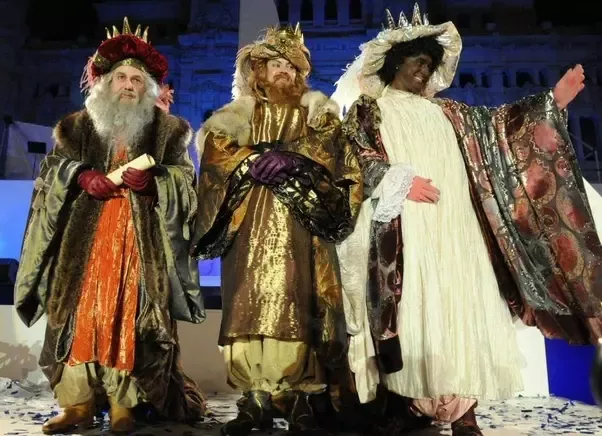
Three Kings' Day brings normalized racism in Spain to the table
In some cities in Spain, the traditional Three Kings Parade still has a racist depictions.
On Wednesday, Jan. 5, the traditional Three Kings Parade has made its way through the cities of Spain, and the normalized racism of its performance has brought the bigger conversation of its persistence in Spanish society. In many cities in Spain, the tradition continues to be celebrated by featuring performers in blackface.
Blackface is a practice that has its origins in minstrel shows, a theatrical and musical genre of the late 20th century in which white people painted their faces and hands black to portray enslaved Black people, ridiculing them in their performances.
Many anti-racist groups and activists have warned about the normalization of the practice, which is protected with the 'tradition' argument. But that 'tradition' no longer has a place in 2022.
RELATED CONTENT
Como cada Navidad, vuelve el blackface, la punta del iceberg de una práctica que parte de lo simbólico para llegar a ese racismo más descarnado.
— Moha Gerehou (@mohagerehou) January 4, 2022
Igualada, Alcoy y otras localidades españolas: súmense a la campaña #StopBlackfaceInSpain de @Afrofeminas y avancen al 2022. pic.twitter.com/abRmVFGwyc
Serigne Mbaye, Podemos deputy in the Assembly of Madrid and former spokesperson of the Sindicato de Manteros de Madrid, harshly criticized that many white people still dress up as King Balthazar on the occasion of the Three Wise Men's Cavalcade in different parts of the country.
Mbaye has joined, as in other years, a campaign proposed by the anti-racist collective and platform Afroféminas, making clear the importance of combating normalized racism and working for a real and respectful representation of different communities.
"Let's see if we understand. In favor of Balthazar, a real Balthazar. No need to paint yourself to try to ridicule," he said.
Me sumo a la campaña #stopblackfaceinspain de @Afrofeminas.
— Serigne Mbaye (@Serigne_Mbaye_) January 2, 2022
Por una cultura libre de racismo. https://t.co/clPsiH92iW
Just as the culture of a people is alive, and is built from tradition, it is possible to maintain a tradition without the need for it to reflect the historical moment in which it was created, but adapting it to the changes and learning we've undergone as a society.











LEAVE A COMMENT: